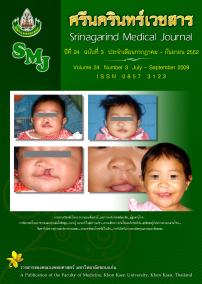ThaiScience
ThaiScience
SRINAGARIND MEDICAL JOURNAL
Volume 35, No. 02, Month MARCH, Year 2020, Pages 167 - 172
Efficacy and safety of imatinib in patients with unresectable or metastatic gastrointestinal stromal tumors (gists) a retrospective cohort study
Kwanjit Danwilai, Atcharapan Rintha, Attapinya Monta, Wittawat Jitpewngarm, Kamonwipa Jitjarern
Abstract Download PDF
Background and Objective: Imatinib is a standard treatment of unresectable or metastatic gastrointestinal stromal tumors (GISTs). In Thailand, the prevalence and effect of treatment in unresectable or metastatic GISTs who receiving imatinib are limited. This study was to assess efficacy and safety of imatinib in patients with unresectable or metastatic GISTs Methods: The retrospective study collected data from medical records and electronic databases of unresectable or metastatic GISTs. Inclusion criteria were aged ≥18 years old with diagnosed unresectable or metastatic GISTs who received imatinib 400 mg/day as first-line treatment and performance status (ECOG) 0 – 2. Patients with no data for evaluation of efficacy or safety, pregnancy/lactation and terminally ill were excluded. Endpoints were efficacy evaluation included progression-free survival (PFS), overall survival (OS), response rate (RR) and safety evaluation. Results: A total of 21 patients, but 1 patient is unable to analyze efficacy outcomes due to receiving less than 3 months of imatinib. Efficacy showed PFS 6.4 years (95% CI 3.0-9.8), OS 8.2 years (95% CI 4.0-12.3). 20% patients attained a partial response, 25% patients revealed a stable disease and 55% patients had a progressive disease. Hematologic toxicities were anemia (86%), neutropenia (38%), thrombocytopenia (29%). The most common non-hematologic toxicities were eyelid edema (71%), edema (43%), weight gain (43%), nausea/vomiting (38%), increasing liver function (33%). In addition, serious adverse events were deep vein thrombosis (5%) and 1 patient admitted with plural effusion and then lost follow up. Conclusions: Unresectable or metastatic GISTs receiving imatinib at 400 mg/day had PFS 6.4 years, OS 8.2 years, and RR 20%. The most common adverse event were anemia and eyelid edema and the serious adverse event was plural effusion.
Keywords
Imatinib, Efficacy, Safety, Gastrointestinal stromal tumors (GISTs)SRINAGARIND MEDICAL JOURNAL
Published by : Faculty of Medicine, Khon Kaen University
Contributions welcome at : http://www.smj.ejnal.com/e-journal/journal/index.php
